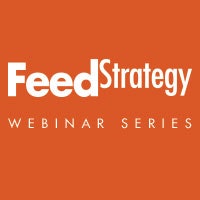
Watch on-demand now to learn the role of the feed supply chain in disease transmission.
When properly executed, on-farm biosecurity programs minimize the risk of animals being exposed to pathogens that may be detrimental to health, welfare, performance – and ultimately, profitability. However, feed is an often-overlooked piece of the biosecurity puzzle. Feed is a proven transmission route for disease, and if pathogens enter

the feed supply chain, chances of infection are high – as animals are exposed multiple times each day as they eat. History demonstrates that African Swine Fever virus is only our most recent challenge. The first reports of pathogen transmission via feed date back to the early 1960s. Since then, research has demonstrated that several pathogens can be harbored and remain infective in feed ingredients for extended periods of time. Thus, feed biosecurity is a critical component of a comprehensive biosecurity program. In this webinar, learn more from featured speakers Dr. Jordan Gebhardt, DVM, Feed Safety Research Team, Kansas State University, and Dr. Paul Sundberg, DVM, Executive Director, Swine Health Information Center about the latest feed biosecurity research and actionable steps you can take to protect your operation from the threat of both endemic and foreign animal diseases.
WHAT YOU’LL LEARN:
- The role of the feed supply chain in disease transmission.
- Key biosecurity principles to control ongoing threats and prevent future disease incursions, such as the African Swine Fever (ASF) virus.
- Update on current research, including what the needs continue to be and what must be done now and in the future to help responsibly mitigate risk.
This webinar is sponsored by Kemin and presented by Feed Strategy and WATT Global Media.
Speaker Info:

Dr. Jordan Gebhardt obtained his PhD in Applied Swine Nutrition and DVM both from Kansas State University. He is a member of the Kansas State University Feed Safety Research Team, which includes veterinarians, swine nutritionists, and feed scientists. The objective of the team is to conduct research on feed biosecurity, with emphasis focused on economically important swine diseases such as Porcine Epidemic Diarrhea virus (PEDV) and African Swine Fever virus (ASFV). Jordan has presented invited talks around the world discussing research and ways to implement biosecurity improvements in the swine feed production system.

Since July 2015, Dr. Paul Sundberg has been the Executive Director of the Swine Health Information Center (SHIC). Dr. Sundberg is responsible for implementing the Center’s mission of protecting and enhancing the health of the United States swine herd through coordinated global disease monitoring, targeted research investments, and analysis of swine health data. Before leading SHIC, he was a Vice President with the National Pork Board and was responsible for the programs and personnel of the Science and Technology Department. Dr. Sundberg has a bachelor’s degree in education from the University of Nebraska-Lincoln. He completed his veterinary medicine curriculum and master’s degree in clinical science/preventive medicine at Iowa State University. He also earned a doctorate degree in veterinary microbiology with a specialty in preventive medicine from Iowa State University. He is board-certified in the American College of Veterinary Preventive Medicine and is a past president of the College